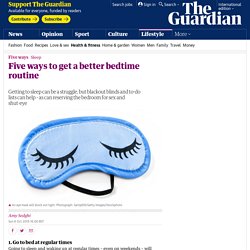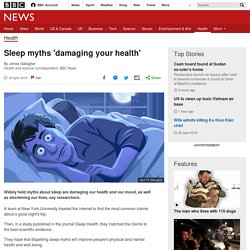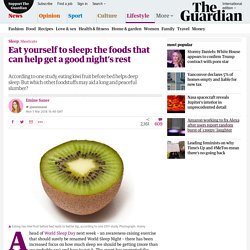

Five ways to get a better bedtime routine. 1.

Go to bed at regular times Going to sleep and waking up at regular times – even on weekends – will strengthen your body clock, says Dr Lizzie Hill, a clinical sleep physiologist and a spokeswoman for the British Sleep Society. Regular mealtimes are also an important cue for your circadian rhythm. Avoid exercise too close to bedtime, as it can cause restlessness and an elevated body temperature, says Samantha Briscoe, a senior physiologist at the Sleep Centre at London Bridge hospital. 2.
Preserve the bedroom as a place for sleep (and sex): there is evidence that the brain forms a strong association with sleep there. 3. Your night-time routine is an opportunity to make mornings run a little smoother: choose your clothes for the next day when you reach for your pyjamas or pack your bag while brushing your teeth. 4. Reading a book can help slow breathing and relax muscles, while yoga stretches or even a gentle walk can reduce anxiety, says Briscoe. 5.
Sleep myths 'damaging your health' Image copyright Getty Images Widely held myths about sleep are damaging our health and our mood, as well as shortening our lives, say researchers.

A team at New York University trawled the internet to find the most common claims about a good night's kip. Then, in a study published in the journal Sleep Health, they matched the claims to the best scientific evidence. They hope that dispelling sleep myths will improve people's physical and mental health and well-being. So, how many are you guilty of? Myth 1 - You can cope on less than five hours' sleep This is the myth that just won't go away.
Former British Prime Minister Margaret Thatcher famously had a brief four hours a night. Yet the researchers said the belief that less than five hours' shut-eye was healthy, was one of the most damaging myths to health. "We have extensive evidence to show sleeping five hours or less consistently, increases your risk greatly for adverse health consequences," said researcher Dr Rebecca Robbins. What would happen if you didn’t sleep? - Claudia Aguirre. Hormonal `alarm clock' is the key to waking on time. SCIENTISTS HAVE discovered that the body has an internal "alarm clock" which can be "set" before people go to sleep.

The discovery shows that waking up from a night's sleep can be consciously controlled so individuals can force themselves out of bed if they really have to. A study of a group of healthy volunteers has shown that the body's alarm clock begins to alert sleepers to the anticipated waking-up time about an hour beforehand. Rising levels of adrenocorticotropin, a hormone released during the day to deal with stress, start to prepare sleepers for the biological wake- up call, according to Jan Born, professor of neuroendocrinology at the University of Lubeck in Germany. When the volunteers were told to wake up at 6am, their hormone levels began to rise about an hour beforehand, but when told they would have to wake at 9am, hormone levelsbegan rising at 8am. Reuse content. Eat yourself to sleep: the foods that can help get a good night’s rest.
Ahead of World Sleep Day next week – an awareness-raising exercise that should surely be renamed World Sleep Night – there has been increased focus on how much sleep we should be getting (more than we probably are) and how to get it.

The event has prompted the strange claim that eating two kiwi fruits before bed leads to better kip – the result of a 2011 study at the Taipei Medical University – to resurface. However, the study was also “supported” by the world’s largest marketer of kiwi fruit, and had just 24 participants. Kiwis do have high levels of serotonin, which is critical to sleep – but what other foods could help? Poultry and nuts Turkey and chicken contain high levels of tryptophan, which also boosts serotonin. Cherries Or you could consume melatonin itself. Bananas and leafy vegetables “Foods that are high in potassium and magnesium help to relax the muscles because a lot of people suffer from things such as restless legs,” says Ramlakhan.
Prebiotics Fibre Since you’re here … Teenagers and sleep - Family Lives. Understanding your teen's body clock "My son David almost missed one of his GCSE’s this summer because he just can't get out of bed in the mornings," says 38 year old Ellen, from Huddersfield.

"I have to leave the house at 7.30 and then I'm worrying the whole time, phoning him every 10 minutes to try and make sure he gets up on time for school. But he’s been late several times because he just can’t wake up. " How hormones affect the teenage body clock Teenagers and their parents have very different body clocks.
When it comes to sleep patterns, there are definite changes in teenagers - particularly around the timing of sleep, explains Neil Stanley, a sleep researcher at the University of East Anglia. Scientist David Bainbridge, author of "Teenagers: A Natural History" believes this is due to a 'rewiring' of the brain in adolescence which may mean that the teenage body clock runs more slowly than an adult's, making the day seem longer. The importance of sleep. Russell Foster: Why do we sleep?